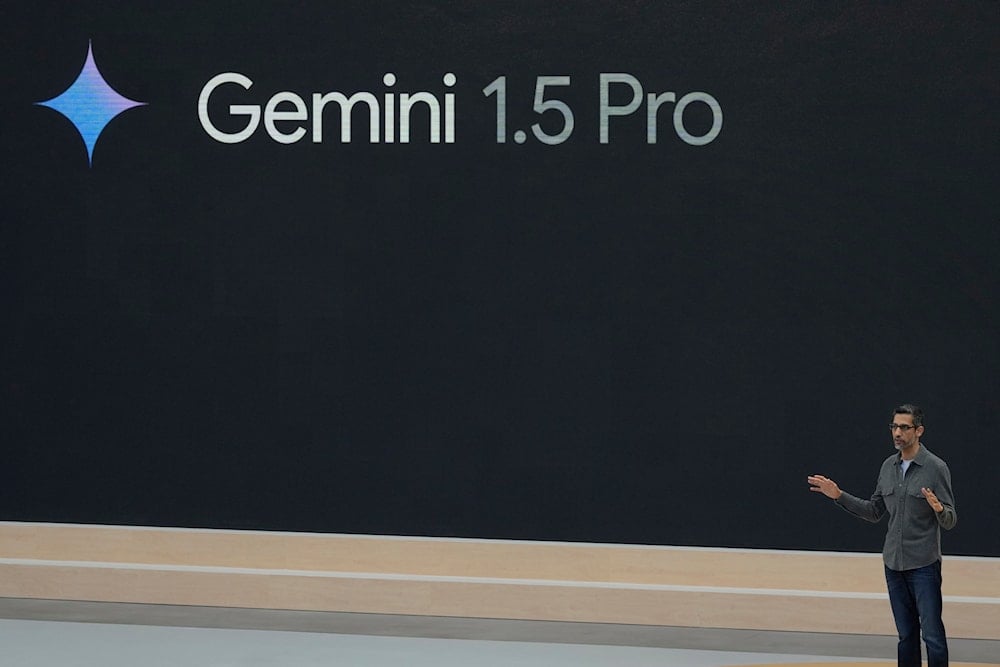Google sued for secretly activating Gemini AI to read user data
Google faces a class-action suit alleging its Gemini AI secretly accessed Gmail, Chat, and Meet data without users’ consent, violating privacy laws.
-

Alphabet CEO Sundar Pichai speaks about Gemini at a Google I/O event in Mountain View, California, on May 14, 2024. (AP Photo/Jeff Chiu, File)
Google is facing a class-action lawsuit accusing it of secretly activating its Gemini AI assistant to monitor the private communications of users across Gmail, Chat, and Meet, Bloomberg reported.
According to the complaint filed late Tuesday in federal court in San Jose, California, the Alphabet Inc. subsidiary “secretly” enabled Gemini across these platforms in October, allowing the AI system to collect and analyze private user data without consent.
According to the Bloomberg report, users were previously given the option to manually activate Gemini. The lawsuit alleges that Google has now embedded the tool by default, giving it access to every recorded interaction within its communication apps.
The plaintiffs argue that Gemini unlawfully collected the “entire recorded history” of private exchanges, including emails and attachments in Gmail accounts. They say users must navigate multiple privacy settings to disable the AI feature, a process the suit describes as “intentionally obscure.”
Unless users manually deactivate it, Gemini allegedly continues to gather, store, and process private data, including confidential correspondence and attachments, as cited by the report.
Complaint cites California privacy violations
The lawsuit contends that Google’s actions violate the California Invasion of Privacy Act, a 1967 law prohibiting surreptitious recording and wiretapping of private communications without the consent of all parties involved. The plaintiffs seek damages and an injunction preventing Google from using Gemini to collect user communications without explicit approval.
As of Wednesday, Google had not issued an official response to the allegations. The company did not immediately reply to media requests for comment outside of regular business hours. If proven, the report mentioned that the case could have broad implications for AI integration and user privacy standards, particularly as major tech firms race to embed generative AI tools across communication platforms.
Read next: Digital sovereignty: How states battle to protect data in AI era
On a related note, earlier this year, a federal jury in San Francisco ordered Google to pay $425 million in damages after finding the tech giant liable for breaching the privacy of millions of users. The class-action lawsuit, originally filed in July 2020, accused Google of continuing to collect user data even after users had disabled tracking through the company’s Web & App Activity setting.
The verdict in Rodriguez v. Google LLC marks a significant win for privacy advocates. The jury concluded that Google violated its own privacy assurances by harvesting data from nearly 98 million users across 174 million devices. Despite users turning off tracking, Google allegedly continued data collection through its partnerships with third-party apps like Uber, Instagram, and Venmo, which used Google Analytics.
At the heart of the case was the Web & App Activity setting, a feature designed to track user interactions across Google services such as Search, Maps, and YouTube. While intended to support personalization and ad targeting, the setting also collected data related to location via IP addresses, even when users had opted out. The lawsuit argued that this practice contradicted Google's own privacy commitments.
The case spanned a broad user base, seeking $31 billion in damages covering approximately 98 million Google account holders. The class certification, approved by Judge Richard Seeborg, emphasized that Google's conduct could reasonably be viewed as "highly offensive," forming the legal basis for the jury’s decision.

 3 Min Read
3 Min Read










